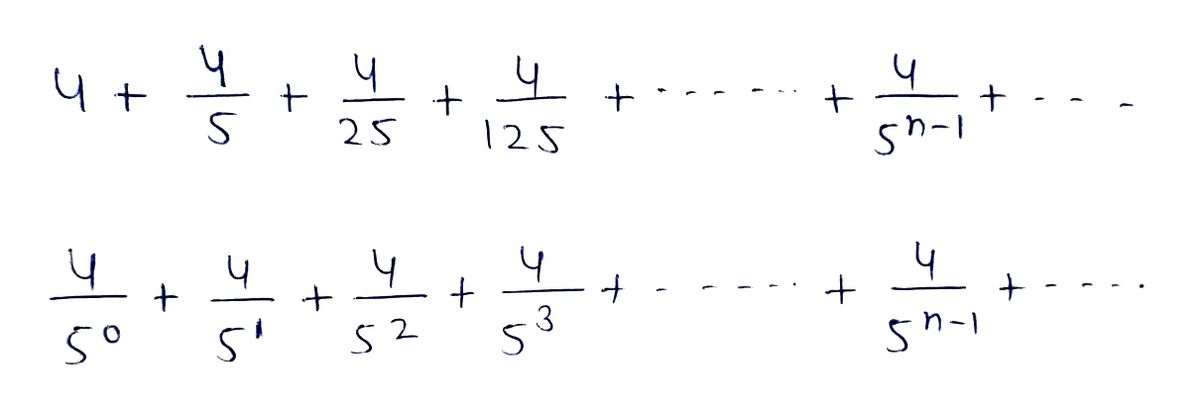4 4 th Find a formula for the n partial sum of the series 4 + 5 sum if the series converges. th The formula for the n" partial sum, sn, of the series is + -- 25 + 4 125 + ... + 5 4 + and use it to find the series'
4 4 th Find a formula for the n partial sum of the series 4 + 5 sum if the series converges. th The formula for the n" partial sum, sn, of the series is + -- 25 + 4 125 + ... + 5 4 + and use it to find the series'
Calculus: Early Transcendentals
8th Edition
ISBN:9781285741550
Author:James Stewart
Publisher:James Stewart
Chapter1: Functions And Models
Section: Chapter Questions
Problem 1RCC: (a) What is a function? What are its domain and range? (b) What is the graph of a function? (c) How...
Related questions
Question
100%
![### Problem Statement
**Objective:**
Find a formula for the \( n^{th} \) partial sum of the series:
\[ 4 + \frac{4}{5} + \frac{4}{25} + \cdots + \frac{4}{5^{n-1}} + \cdots \]
and use it to find the series' sum if the series converges.
### Tasks
1. Determine the formula for the \( n^{th} \) partial sum, \( s_n \), of the series.
2. Explain how to find the sum of the series, assuming it converges.
### Solution Format
- The formula for the \( n^{th} \) partial sum, \( s_n \), of the series is given by:
\[ \boxed{\text{[Place Formula Here]}} \]
### Note
- This is a geometric series with the first term \( a = 4 \) and common ratio \( r = \frac{1}{5} \).
- Use the formula for the sum of the first \( n \) terms of a geometric series:
\[ s_n = a \frac{1-r^n}{1-r} \]
- Determine convergence by examining if \( |r| < 1 \), and apply the sum formula for an infinite geometric series:
\[ S = \frac{a}{1-r} \]](/v2/_next/image?url=https%3A%2F%2Fcontent.bartleby.com%2Fqna-images%2Fquestion%2F87314332-e2f5-4784-8bd6-50bd771df639%2Fc0eec546-3d30-4d5b-9e24-20978749c7a7%2Fev9g6cw_processed.jpeg&w=3840&q=75)
Transcribed Image Text:### Problem Statement
**Objective:**
Find a formula for the \( n^{th} \) partial sum of the series:
\[ 4 + \frac{4}{5} + \frac{4}{25} + \cdots + \frac{4}{5^{n-1}} + \cdots \]
and use it to find the series' sum if the series converges.
### Tasks
1. Determine the formula for the \( n^{th} \) partial sum, \( s_n \), of the series.
2. Explain how to find the sum of the series, assuming it converges.
### Solution Format
- The formula for the \( n^{th} \) partial sum, \( s_n \), of the series is given by:
\[ \boxed{\text{[Place Formula Here]}} \]
### Note
- This is a geometric series with the first term \( a = 4 \) and common ratio \( r = \frac{1}{5} \).
- Use the formula for the sum of the first \( n \) terms of a geometric series:
\[ s_n = a \frac{1-r^n}{1-r} \]
- Determine convergence by examining if \( |r| < 1 \), and apply the sum formula for an infinite geometric series:
\[ S = \frac{a}{1-r} \]
Expert Solution
Step 1

Step by step
Solved in 3 steps with 3 images

Recommended textbooks for you

Calculus: Early Transcendentals
Calculus
ISBN:
9781285741550
Author:
James Stewart
Publisher:
Cengage Learning

Thomas' Calculus (14th Edition)
Calculus
ISBN:
9780134438986
Author:
Joel R. Hass, Christopher E. Heil, Maurice D. Weir
Publisher:
PEARSON

Calculus: Early Transcendentals (3rd Edition)
Calculus
ISBN:
9780134763644
Author:
William L. Briggs, Lyle Cochran, Bernard Gillett, Eric Schulz
Publisher:
PEARSON

Calculus: Early Transcendentals
Calculus
ISBN:
9781285741550
Author:
James Stewart
Publisher:
Cengage Learning

Thomas' Calculus (14th Edition)
Calculus
ISBN:
9780134438986
Author:
Joel R. Hass, Christopher E. Heil, Maurice D. Weir
Publisher:
PEARSON

Calculus: Early Transcendentals (3rd Edition)
Calculus
ISBN:
9780134763644
Author:
William L. Briggs, Lyle Cochran, Bernard Gillett, Eric Schulz
Publisher:
PEARSON

Calculus: Early Transcendentals
Calculus
ISBN:
9781319050740
Author:
Jon Rogawski, Colin Adams, Robert Franzosa
Publisher:
W. H. Freeman


Calculus: Early Transcendental Functions
Calculus
ISBN:
9781337552516
Author:
Ron Larson, Bruce H. Edwards
Publisher:
Cengage Learning